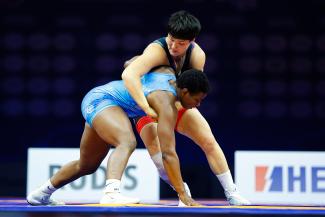Greco-Roman World Clubs Cup Line-ups Announced
Wednesday, December 13, 2017 - 12:51 By Ali Feizasa

The 2017 Greco-Roman World Clubs Cup is set to take place in Isfahan, Iran, Thursday and Friday.
Of the 13 competing teams, the four who are potential favorites to wrestle for the World Clubs Cup title will be Bimeh Razi (IRI), Buyuksehir (TUR), Moscow (RUS), and Sina Sanat Izeh (IRI).
In the line-up for Sina Sanat Izeh (IRI), the defending champions, is world champion, Maksim MANUKYAN (ARM) and Olympic silver medal winner, Zhan BELENYUK (UKR).
Leading a loaded Moscow squad will be six-time Olympic and world medal winner, Aleksei MISHIN (RUS). Others stars in action for Moscow include world finalist, Musa EVLOEV (RUS), 2017 U-23 world silver medalist, Sergey EMELIN (RUS), and Russian Championships runner-up, Ilias MAGAMADOV (RUS).
Directing Bimeh Razi, the host team, will be Olympic gold medalist, Roman VLASOV (RUS) and Olympic bronze medalist, Saeid ABDEVALI (IRI). Other big names wrestling for Bimeh Razi are three-time junior world champion Zviadi PATARIDZE (GEO), 2017 world bronze medalist, Mohammad Ali GERAEI (IRI), and Artem SURKOV (RUS).
Led by world champion, Metehan BASAR (TUR) and U-23 world champion Burhan AKBUDAK (TUR), World Clubs Cup runner-up in 2017, Buyuksehir (TUR) will be another event favorite.
The competition will be held with new rules in 10 weight categories.
Program of 2017 GR World Clubs Cup:
Thursday
7:30 to 8:00 – Weigh in
10:00 to 14:00- First & second round
15:00 to 16:30- Second and Third round
16:30 to 17:00- Opening ceremony
17:00 to 18:30- Third round
18:30 to 21:30- Competition between second to fourth teams of the groups
Friday
7:00 to 7:30- Weigh-in
9:00 to 10:30- Semifinals between group winners
10:30 to 12:00- Competitions for fifth place to tenth place winners
13:30 to 15:00- Third place match
15:00 to 16:30- Final match
Predictable line-ups of 2017 GR Wrestling World Clubs Cup:
Moscow Team (RUS)
55kg- Aleksei KINZHIGALIEV (RUS)
60kg- Sergey EMELIN (RUS)
63kg- Sanal SEMENOV (RUS)
67kg- Pavel SALEEV (RUS)
72kg- Denis MURTAZIN (RUS)
77kg- Ilias MAGAMADOV (RUS)
82kg- Roman YUSIPOV (RUS)
87kg- Aleksei MISHIN (RUS)
97kg- Musa EVLOEV (RUS)
130kg- Zurabi GEDEKHAURI (RUS)
Bimeh Razi Isfahan (IRI)
55kg-– Saman ABDEVALI (IRI)
60kg- Mehrdad MARDANI (IRI)
63kg- Moslem NADERI- Hossein ASADI (IRI)
67kg- Artem SURKOV (RUS)
72kg- Mohammad Ali GERAEI (IRI) - Farshad BELFEKE
77kg- Saeid ABDEVALI
82kg-Roman VLASOV (RUS) - Mehdi FALLAH (IRI)
87kg- Ali Akbar HEYDARI
97kg- Seyed Mostafa SALEHIZADEH (IRI)
130kg- Zviadi PATARIDZE (GEO) - Shahab GHOURE JILI (IRI)
Buyuksehir (TUR)
55kg- Hammet RUSTEM (TUR)
60kg- Muslum ALINLI
63kg- Fatih UCUNCU (TUR)
67kg- Atakan YUKSEL (TUR)
72kg- Yunus OZEL (TUR)
77kg- Serkan AKKOYUN (TUR)
82kg- Burhan AKBUDAK (TUR)
87kg- Metehan BASAR (TUR)
97kg- Fatih BASKOY (TUR)
130kg- Irfan METE (TUR)
Sina Sanat Izeh (IRI)
55kg- Shirzad BEHESHTI TALA (IRI) – Shahin BODAGHI
60kg- Meysam DELKHANI (IRI) – Reza KHEDRI (IRI)
63kg- Mohammadreza GERAEI (IRI)
67kg- Karen ASLANYAN (ARM) – Behnam MORADI (IRI)
72kg- Ali ARSALAN (IRI)
77kg- Payam BOYERI (IRI)
82kg- Maksim MANUKYAN (ARM) – Keyvan REZAEI (IRI)
87kg- Zhan BELENYUK (UKR)
97kg- Hassan ARYANEJAD
130kg- Mehdi NOURI (IRI)
Dinamo Armenia (ARM)
55kg- Rudik MKRTCHYAN (ARM)
60kg- Murad HARUTYUNYAN
63kg- Slavik GALSTYAN (ARM)
67kg- Aleksan MIKAYELYAN
72kg- Armen HAKOBYAN (ARM)
77kg- Ruben GHARIBYAN (ARM)
82kg- Argishti ABGARYAN (ARM)
87kg- Gegam TORGOMYAN (ARM)
97kg- Vagharsak MINASYAN (ARM)
130kg- Edgar KHACHATRYAN (ARM)
Georgian Club (GEO)
55kg- Nugzari TSURTSUMIA (GEO)
60kg- Beka BALANCHIVADZE (GEO)
63kg- Dato CHKHARTISHBILI
67kg- Tornike JANGAVADZE (GEO) – Muradi MIKELADZE (GEO)
72kg- Ramazi ZOIDZE (GEO) - Sachino DAVITAIA (GEO)
77kg- Bakuri GOGOLI (GEO)
82kg- Varlami KVARATSKHELIA
87kg- Gurami KHETSURIANI (GEO)
97kg- Kukuri KIRTSKHSLIA
130kg- Levani ARABULI (GEO)
Paok Greece (GRE)
55kg- TBD
60kg- Odysseas MOURTIDIS (GRE)
63kg- Christos THEODORAKIS (GRE)
67kg- Konstantinos MAKRIDIS (GRE)
72kg- Petros MANOUILIDIS (GRE)
77kg- Panagiotis SISMANIDIS (GRE)
82kg- Ioannis TSEKERIDIS (GRE)
87kg- Dimitrios TSEKERIDIS (GRE)
97kg- Leon Laokratis BJURBERG KESSIDIS (GRE)
130kg- Georgios BETAS (GRE)
Budapest SC (HUN)
55kg- József ANDRASI (HUN)
60kg- István VANCZA (HUN)
63kg- Bence KOVACS (HUN)
67kg- István KOZAK (HUN)
72kg- Martin TOTH (HUN)
77kg- Dominik GEGENY
82kg- Dáriusz VITEK
87kg- Bence MARTIN
97kg- Róbert ÉRSEK
130kg- Arnold PAP
Samsun (UKR)
55kg- Sergii STOROZHENKO (UKR)
60kg- Andriy MARTYNYUK
63kg- Anton KUTSENKO (UKR)
67kg- Fevzi MAMUTOV (UKR)
72kg- Artur POLITAIEV
77kg- Pavlo MOLNAR (UKR)
82kg- Yaroslav FILCHAKOV (UKR)
87kg- Iurii SHKRIUBA
97kg- Myloka KRYSOV
130kg-Mykola KUCHMII
SHOHADAYE Modafe Haram QOM (IRI)
55kg- Mehdi GHORBANI- Mohammad Javad REZAEI (IRI)
60kg- Alireza NEJATI (IRI) - Reza MARDI (IRI)
63kg- Ali ASghar PASALARI
67kg- Mehdi MORAD SALEHI (IRI) - Behnam AFSHAR NIK
72kg- Ali SOLEYMANI (IRI) - Afshin ESLAMI (IRI)
77kg- Hadi ALIZADH - Mohammad Reza REZAEI (IRI)
82kg-Mehdi EBRAHIMI (IRI)
87kg- Mohammad Ali HEYDARI (IRI)
97kg- Omid EFTEKHARI ASL
130kg- Parsa NAZARI (IRI)
Sport Club Physical Academy (KGZ)
55kg-Dastan KADYROV (KGZ)
60kg- Iliiaz SEITOV (KGZ)
63kg- Adil DZHUMABEKOV
67kg- Konokbai SAGYNBEKOV (KGZ)
72kg: TBD
77kg: TBD
87kg-Ilim BILIMOV (KGZ)
97kg-Ilgiz BILIMOV (KGZ)
130kg: TBD
Other members of Kirgizstan team:
uulu Arstanbek
Ulan Derkembaev
Kubat Mambetov
Roman Muratov
Maksat Omorov
Pakhmatbek Zainitdinov
Erbol Zhaparaliev
Kubatbek Zheenaliev
Tajik Air (TJK)
55kg- Khasan SUFIEV (TJK)
60kg-TBD
63kg- Zainudin QAMAROV (TJK)
67kg- Oiqi AMIRKHONZODA (TJK)
72kg- Azizbeki SHARIFZODA (TJK)
77kg-Sulton Shokhi KHASANOV
82kg- Sukhrob ABDULKHAEV (TJK)
87kg- Amirjon JURAEV
97kg- Mirzoamin SAFAROV
130kg- Azmuddin VAKHOBOV (TJK)
Romania Olympic Hopes (ROU)
55kg- Florin TITA (ROU)
60kg- Razvan ARNAUT (ROU)
63kg- Teodor HORATAU (ROU)
67kg- Irinel BOTEZ MIHAI (ROU)
72kg- Boanta NICOLAE
77kg- Adrian AGACHE
82kg- TBD
87kg- Samuel OJOG NICU (ROU)
97kg- Constantin PIRVAN DORIN (ROU)
130kg- Alin ALEXUC CIURARIU- Istvan BEREI LENARD (ROU)


Share your thoughts.
Comments